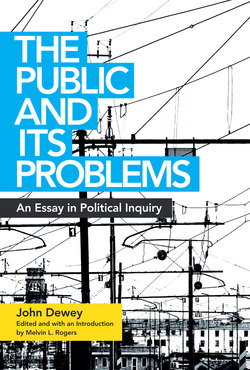Читать книгу The Public and Its Problems - Джон Дьюи - Страница 8
На сайте Литреса книга снята с продажи.
ОглавлениеChronology
| 1859, October 20 | John Dewey is born in Burlington, Vermont |
| 1879 | Receives AB from the University of Vermont |
| 1879–81 | Teaches at high school in Oil City, Pennsylvania |
| 1881–82 | Teaches at Lake View Seminary, Charlotte, Vermont |
| 1882–84 | Attends graduate school at Johns Hopkins University |
| 1884 | Receives PhD from Johns Hopkins University |
| Instructor in the Department of Philosophy at the University of Michigan | |
| 1886 | Married to Alice Chipman |
| 1887 | Psychology |
| 1888 | Leibniz’s New Essays Concerning the Human Understanding: A Critical Exposition |
| “The Ethics of Democracy” (first published reflection on democracy) | |
| 1888–89 | Professor of mental and moral philosophy at the University of Minnesota |
| 1889 | Chair of Department of Philosophy at the University of Michigan |
| 1891 | Outlines of a Critical Theory of Ethics |
| 1894 | Professor and chair of Department of Philosophy (including psychology and pedagogy) at the University of Chicago |
| The Study of Ethics: A Syllabus | |
| 1896 | Founder of the University of Chicago Laboratory School (officially University Elementary School) |
| 1897 | Elected to board of trustees, Hull House Association (originally a settlement house for recently arrived European immigrants) |
| 1899 | The School and Society |
| 1899–1900 | President of the American Psychological Association |
| Studies in Logical Theory | |
| 1904 | Professor of philosophy at Columbia University and Teachers College |
| 1905–6 | President of the American Philosophical Society |
| 1908 | Ethics (with philosopher James Hayden Tufts) |
| 1909 | Supporting member in founding the NAACP (National Association for the Advancement of Colored People) |
| 1910 | How We Think |
| The Influence of Darwin on Philosophy | |
| 1915–16 | President of the American Association of University Professors (organization devoted to the advancement of academic freedom) |
| 1916 | Democracy and Education |
| Essays in Experimental Logic | |
| 1919 | Lectures in Japan |
| 1919–21 | Lectures in China |
| 1920 | Reconstruction in Philosophy |
| 1922 | Human Nature and Conduct |
| 1924 | Visits schools in Turkey |
| 1925 | Experience and Nature |
| 1926 | Visits schools in Mexico |
| 1927 | The Public and Its Problems |
| Death of Alice Chipman Dewey | |
| 1928 | Visits schools in Soviet Russia |
| 1929–36 | President, People’s Lobby (devoted to advancing and realizing social democratic commitments on behalf of unions and the poor) |
| 1929–33 | Chairman of National Committee of League for Independent Political Action (devoted to the establishment of a third political party) |
| 1929 | The Quest for Certainty |
| 1930 | Individualism, Old and New |
| Retires from position at Columbia University, appointed professor emeritus | |
| 1932 | Ethics (revised edition; with philosopher James Hayden Tufts) |
| 1933 | How We Think (revised edition) |
| 1934 | A Common Faith |
| Art as Experience | |
| 1935 | Liberalism and Social Action |
| 1937 | Chair of the Commission of Inquiry into the Charges Made against Leon Trotsky in the Moscow Trials, Mexico City |
| 1938 | Logic: The Theory of Inquiry |
| Experience and Education | |
| 1939 | Freedom and Culture |
| Theory of Valuation | |
| 1946 | Married to Roberta (Lowitz) Grant |
| Knowing and the Known (with political scientist Arthur Fisher Bentley) | |
| 1952, June 1 | Dies in New York City |
In the preparation of this chronology I have relied on many sources, especially the similar chronologies in Larry A. Hickman and Thomas M. Alexander, eds., The Essential Dewey, vol. 1, Pragmatism, Education, Democracy (Bloomington: Indiana University Press, 1998); Barbara Levine, “Chronology of John Dewey’s Life and Work,” Center for Dewey Studies, Carbondale, Illinois (http://www.siuc.edu/~deweyctr/about_bio.html); Molly Cochran, ed., The Cambridge Companion to Dewey (New York: Cambridge University Press, 2010).
